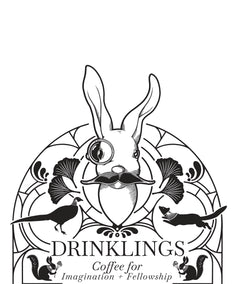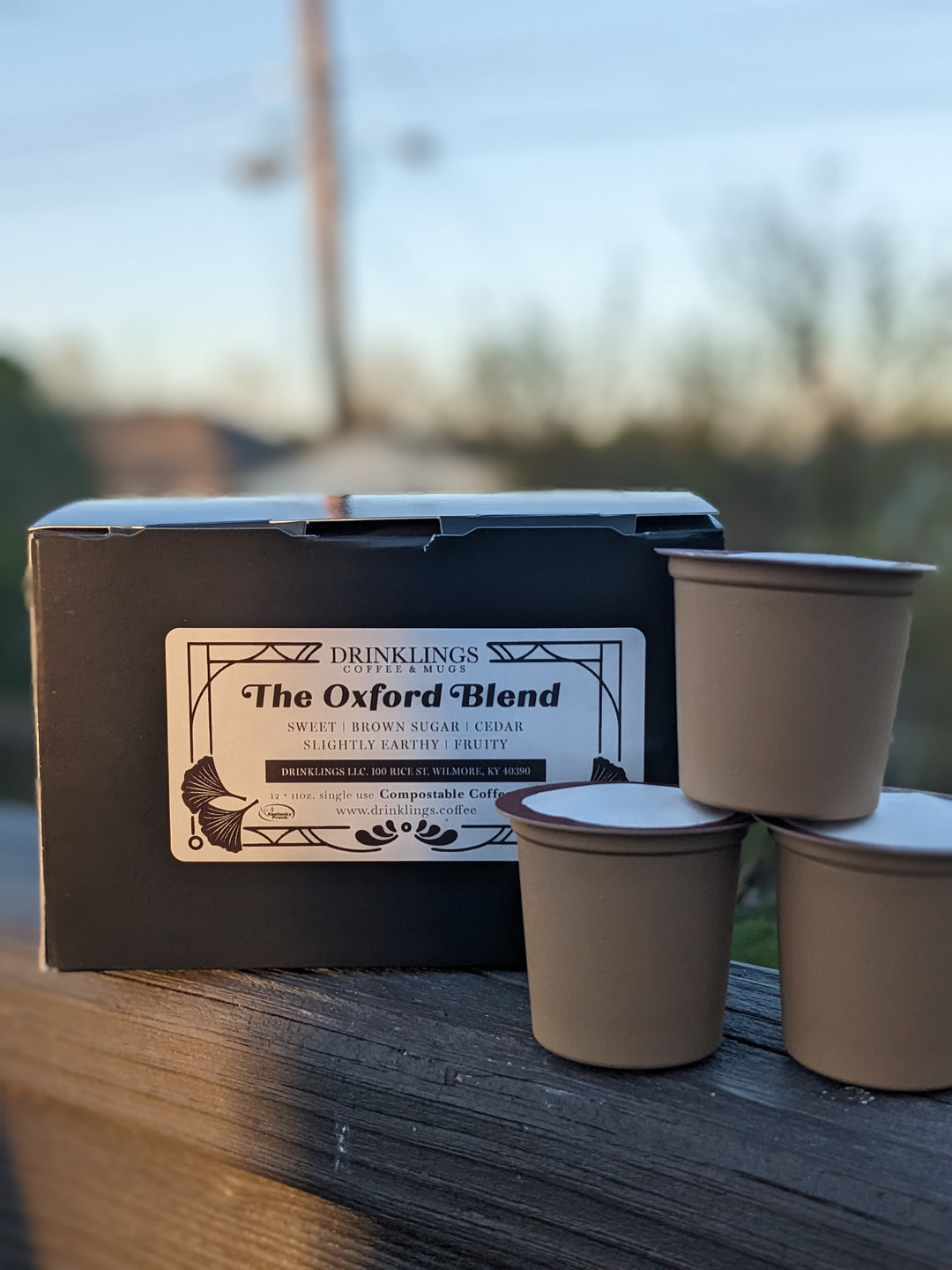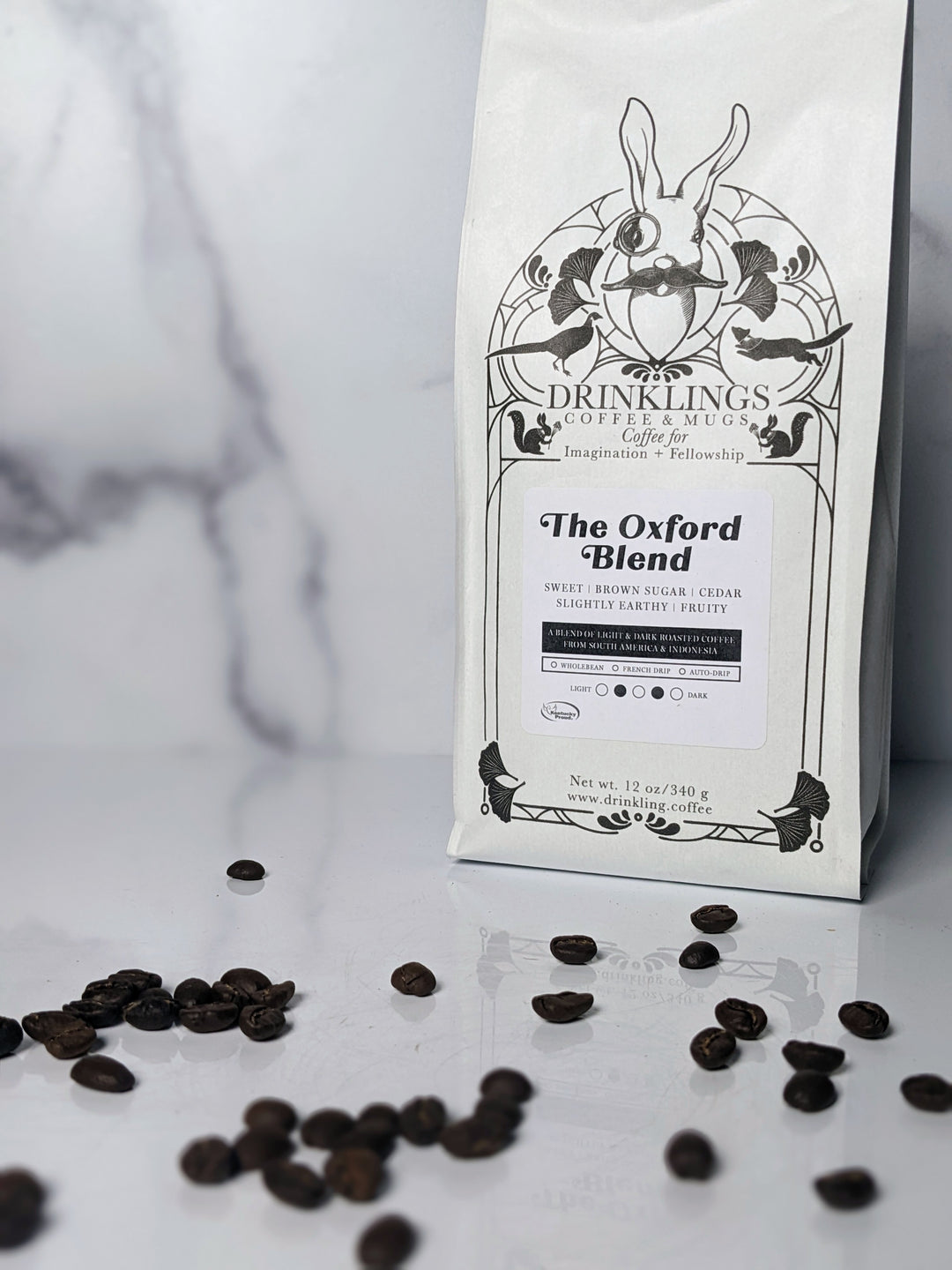Why Coffee for Imagination
It goes without saying that one of the lures of modern coffee shops is the potential for such places to synthesize creativity and coffee together under a single roof. Arguably, there are no other modern day American parallels in terms of public spaces and institutions. One can journey across the world and find all sorts of people--even those that don’t particularly like coffee--fraternizing coffee shops as a place to explore their creative potential. Creativity and coffee, it seems, have a symbiotic relationship that our culture has confirmed and approved as a socially sacred space.
But while we recognize the importance of creativity to the modern coffee movement, we did not choose to be a coffee company based around that concept when we re-organized our mission. We could not be a coffee shop without creativity. Creativity was necessary but not sufficient. Or in other words, Drinklings had to be creative to be what it was supposed to be but it was not merely enough to be creative. Creativity was not the end all be all of this company. Rather, there was some other end all that was deeper, more meaningful, more nuanced.
For individuals like C.S. Lewis and J.R.R. Tolkien (the most notable figure heads of the Oxford Inklings Society), the concept of imagination was central to the creation of meaning. This emphasis on imagination was very lucid in their mid-twentieth century writers society and it bled through almost every piece of literature that its members contributed to the world. It would short change what they were about and the impact of their work to call what they did “creative writing.” Rather, what they did was “imagine” and what their gathering sought to do was to imagine collectively in fellowship.
This concept of “imagination” is different than “creativity.” Whereas creativity is the making of something that is not yet, imagination is the conveyance of meaning in what is created. It says that in this thing there is a story to tell. In this thing, there is truth to convey. In this thing, something is communicated beyond merely the object or the artist. There is, shall we say, a philosophy behind imagination that does not necessarily exist in the notion of creativity and that imagination is more concerned with morals, structure, and what should be rather than simply what is and what can be. Tolkien called imagination, “the inner consistency of reality.” And Lewis, famously, called it “the organ of meaning.”
And so this brings us to this question: how is a coffee company for imagination and what are we particularly trying to achieve?
If one pays attention to the development of the coffee industry over the past several decades one can chart exponential graphs regarding the commercialization of coffee in a myriad of ways. The fact that coffee is only second to crude oil on the American GDP is telling. One can only imagine the hell that we would pay not merely personally but economically/industrially if coffee became in short supply (the current ecological dangers of coffee, by the way, is something worth attending to but that is a different blog entirely). But as with most things that become sources of major economic value, we find ways of utilizing it. We find ways to cheapen it. Exploit it. Make it expedient. Overuse it. Abuse it. As a friend once remarked to me about a coffee farm that was undergoing a major corporate purchase, the economic utility of that farm could be summarized by the phrase, “Buy it up, use it up, close it up.”
This is where imagination, not creativity, becomes the antithesis of the abuses of corporatization. Corporations can stomach creativity. They can even partake in it (this is often seen where big corporations see something being done at an artisanal level and seek to make their own versions of it). But corporations cannot stomach imagination because imagination threatens to bring to the corporate and modernized world a set of values, ideas, and questions that are inimical to it. It asks the should we question before asking the can we question. In creativity, the aforementioned question is generally assumed.
The “third wave” movement in coffee did a lot to combat this commercialization and modernization of coffee by initiating a movement of small coffee roasters and coffee shops focusing on artisan/regional coffee and a creative community space that was non-corporatized (this is where the ‘third space’ and ‘third wave’ of coffee meet). And in this sense, Drinklings is just as much a third wave roaster and a third wave coffee house as many others are. But instead of simply responding to the commercialization and industrialization of coffee as such, we are suggesting that what is needed is a reformation of the world’s values in general.
In our little establishment with our little project going, we can’t do that. Of course. That’s a big project with a lot of players and one that ultimately our culture (much less a business) is likely to lose without a full scale revolution. But we can practice it in what we do and encourage it through the space that we have and the kind of things we want to develop and put on through that concept of imagination. The ways that people see our business. Our product. Our values. Our team of employees. The content that we put out. The events that we hold and put on. The conversations we have. The topics we raise through the blog and (forthcoming) podcast. And most importantly, the way that our product and space help people cultivate their own questions of meaning in the modern world. For as we talk about imagination and coffee as a catalyst for that, we ultimately want to create a space where people know the big questions are valued and they are valued because we are asking them as well.
I was thinking the other day of the vices that Lewis, Tolkien, Chesterton, and that whole ilk of writers enjoyed. In general, those vices have remained. But we’ve industrialized them. Made them easier. Made them part of a factory belt. Can you imagine C.S. Lewis going to a modern grocery store and picking up a 12 pack of “whatever-you-call-it lite?” or a pre-bagged box of tea that was bagged who knows when and sitting on a shelf for who knows how long? Or Chesterton, instead of rolling his own tobacco, picking up a pack of factory made cigarettes at a local gas station? Or T.S. Eliot, who famously said, "I measure my life in coffee spoons" saying instead "I measure my life in plastic coffee pods." Heck, Tolkien refused to use a car because he saw the automobile as compromising the beauty of the creation (we might now think that’s a bit overkill but I don’t necessarily disagree that is what has happened). Why?
This isn’t simply because they were Victorian era curmudgeons (there may have been some of that, of course). It was because they held a set of values about the world that shaped how they did day to day life. It was slower. More intentional. More relational. Virtue was not a by-gone term and nobility was something that was still talked about. Ethics were not relative. There was wisdom to learn through old books. The skyline of mountains was to be preferred over the skyline of skyrises. Hard things were worth doing for their own sake because there was purpose in doing them. Discomfort was not something to be itched away. Time was not seen as a tool but as a grace.
While there is no escaping the modern world (nor are we suggesting there should be), there is the question of whether we are blind to its missteps in our daily lives and whether a simple question like “How do I practice my morning coffee?” can illuminate a set of values in our lives about meaning and the “inner structure of reality.” We believe it can.
That makes Drinklings more of a project than a business. A project of how we can illuminate the importance of imagination as practice in our business, in our product, and in--in so far as we can reach--the lives of our customers and community.
But with imagination comes the second side of the equation: fellowship. We'll turn to that in the next blog.




